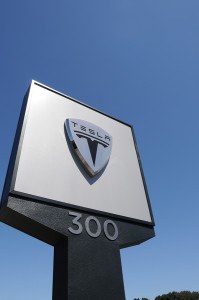Tesla Inc. is facing its first U.S. legal challenge over self-driving technology in a case alleging the electric carmaker sold 47,000 vehicles with Autopilot software that’s “dangerously defective” when engaged.
Drivers have “become beta testers of half-baked software that renders Tesla vehicles dangerous,” according to a complaint filed Wednesday in San Jose, California, federal court. Consumers allege their cars – purchased for $81,000 to $113,000 – sometimes veer out of lanes, “lurching, slamming on the brakes for no reason, and failing to slow or stop when approaching other vehicles” when Autopilot is activated.
The case was filed as a class action on behalf of Model S and Model X owners who bought their vehicles during the two quarters ending March 31. At least half of the 47,000 cars have second-generation Autopilot features that cost an extra $5,000 per car, according to the consumers, who claim their cars’ safety features are either non-functioning or unsafe to use. That’s contrary to marketing by Tesla that promised full functionality by December 2016, according to the complaint.
 Tesla says it’s never claimed its vehicles are armed with “full self-driving capability.”
Tesla says it’s never claimed its vehicles are armed with “full self-driving capability.”
“This lawsuit is a disingenuous attempt to secure attorney’s fees posing as a legitimate legal action, which is evidenced by the fact that the suit misrepresents many facts,” the company said in a statement. “The inaccurate and sensationalistic view of our technology put forth by this group is exactly the kind of misinformation that threatens to harm consumer safety.”
A day after the suit was filed, Tesla recalled 53,000 Model S and Model X vehicles to replace faulty electronic parking brakes that may not release properly. Vehicles assembled between February and October last year contain a small gear that could have been manufactured improperly by Tesla’s supplier, according to a statement on the company’s website. If that gear were to break, the parking brake could become stuck in place, Tesla said.
Road Conditions
All Tesla cars produced since October 2014 have Autopilot hardware, which has allowed the company to collect more than 1.3 billion miles of data from Autopilot-equipped vehicles operating under diverse road and weather conditions. The company constantly improves the features via over-the-air software updates that are automatically rolled out to customers.
Tesla’s Autopilot technology came under fire last year when a 40-year-old Ohio man was killed after his 2015 Model S drove under the trailer of an 18-wheeler on a Florida highway.
While the Florida accident didn’t trigger a lawsuit, drivers who lost control of their cars before they rammed through garage walls and and apartment buildings sued Tesla last year. The drivers’ allegations that some Tesla vehicles suffer from a sudden acceleration problem are pending in Los Angeles federal court.
The case is Sheikh v. Tesla Inc., 17-02193, U.S. District Court, Northern District of California (San Jose).
Was this article valuable?
Here are more articles you may enjoy.

 Cape Cod Faces Highest Snow Risk as New Coastal Storm Forms
Cape Cod Faces Highest Snow Risk as New Coastal Storm Forms  Founder of Auto Parts Maker Charged With Fraud That Wiped Out Billions
Founder of Auto Parts Maker Charged With Fraud That Wiped Out Billions  Tesla Sued Over Crash That Trapped, Killed Massachusetts Driver
Tesla Sued Over Crash That Trapped, Killed Massachusetts Driver  Portugal Rolls Out $2.9 Billion Aid as Deadly Flooding Spreads
Portugal Rolls Out $2.9 Billion Aid as Deadly Flooding Spreads 